'Trust God to be our healer:’ As COVID-19 vaccine mandates grow, so are requests for religious exemptions
- Oops!Something went wrong.Please try again later.
WASHINGTON – After Denver announced this month that city employees and workers in hospitals and other high-risk settings must be vaccinated against COVID-19, Colorado’s Catholic bishops told parishioners how to seek a religious exemption.
That’s despite the fact the Catholic Church does not oppose the vaccines and Pope Francis said he believes that, ethically, everyone should get one.
In Louisiana, Attorney General Jeff Landry created a form for those who object to mask and vaccine mandates, allowing them to assert they do not consent to “forcing a face covering on my child, who is created in the image of God.”
“I believe that our body is the temple of the Holy Spirit and that I am called to honor God in how I care for my body,” the form states.
Liberty Counsel, a Florida-based group that defends religious freedom cases, said it fields thousands of requests for assistance to avoid vaccinations – including many from federal employees.
“It’s huge,” Liberty Counsel chairman Mathew Staver said.
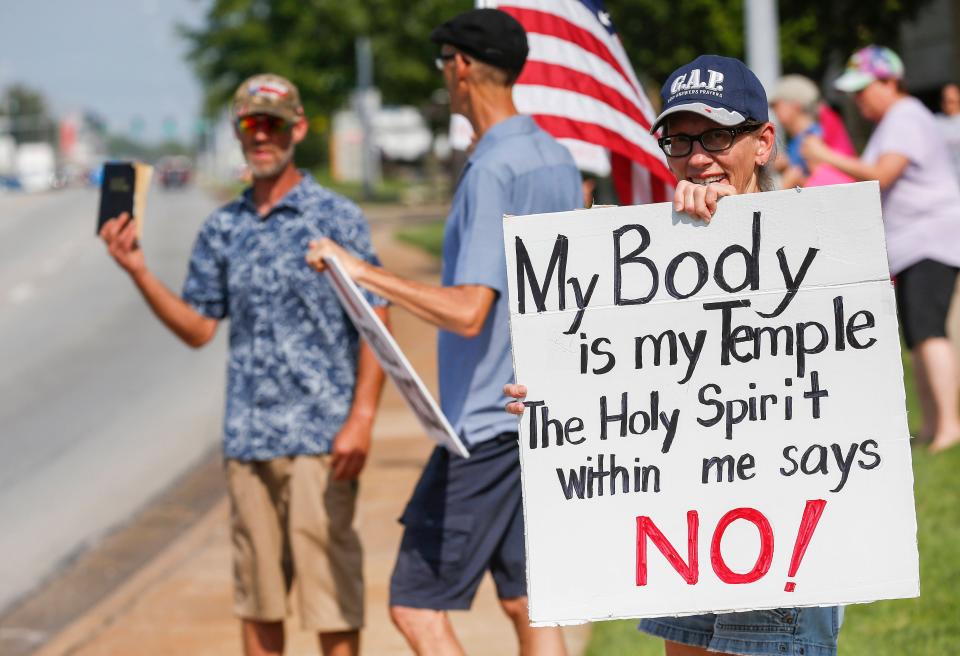
As mandates for vaccines and masks become more common amid the widespread circulation of the highly transmissible delta variant, also increasing are efforts to use religion to sidestep the requirements.
Experts worry religious exemptions could undercut mandates, similar to how they’ve contributed to outbreaks in preventable childhood diseases, even though most major religions don’t object to vaccines.
Anthony Fauci, top medical adviser to President Joe Biden, said religious exemptions are “something we should look at.”
“If there is a legitimate religious exemption, fine. I am one of the people that respect the tenets of religion,” Fauci told USA TODAY's Editorial Board. “But if people make it up, and it's really a philosophical reason and they’re saying it's religious, that's not good.”
Anthony Fauci: Expect 'a flood' of COVID-19 vaccine mandates after full FDA approval
Few religions oppose vaccinations
When vaccinologist John Grabenstein looked at how the world’s major religions view vaccines for a paper in 2013, he found few theologically based objections. An exception was Christian Scientists, who believe in the healing power of prayer rather than modern medicine.
He found plenty of examples of religions calling on people to stay healthy to prevent infection.
“Every one of the major religions has a major emphasis on preserving life, whether that's Judaism, Christianity, Islam, etc.” he said. “Oftentimes, (there is) a claim of a religious prohibition, (but) when you get down into reading what the religions teach, it's not there.”
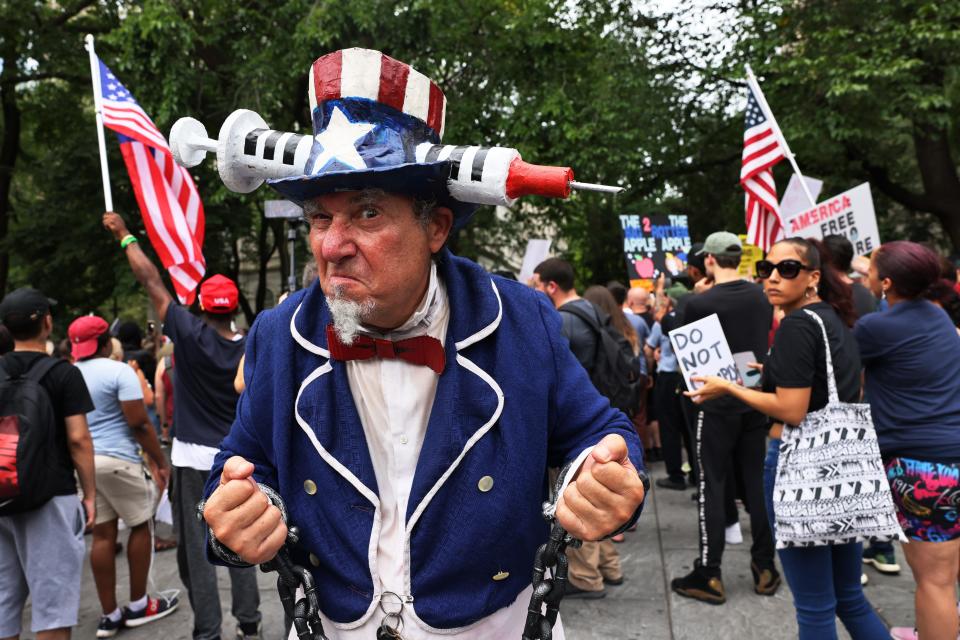
States can require vaccinations
It’s been more than a century since the Supreme Court ruled that states can require residents to be vaccinated against smallpox.
Religious exemptions for school immunization requirements began in the 1960s to accommodate Christian Scientists and other similar minorities, according to legal scholar Dorit Rubinstein Reiss.
Courts have since struck down religious exemptions limited to organized or established religions as too narrow. They must apply if a person’s beliefs are “sincerely held.”
In 2012, a federal court in Ohio said that veganism, in some circumstances, could plausibly be considered a religious belief, rather than merely a social philosophy or dietary preference.
“It is essentially impossible to look inside someone else and make a judgment about how honestly or deeply felt (a belief) is,” Grabenstein said. “So it’s a conundrum for society.”

'Vulnerable to abuse'
The courts were right to keep government out of the practice of judging people’s souls, said Reiss, a professor at the University of California Hastings College of Law.
“The problem is,” she said, “that makes policing (religious exemptions) very hard.”
The difficulty is compounded by the fact that religious freedom is a core value in the USA.
Reiss said there’s no hard data to show how many people falsely claim religious beliefs to avoid vaccinations.
“But I can say we have very strong indication most of them are,” she said.
One clue is that when people are surveyed about why they do not vaccinate, they typically raise safety concerns rather than religious views. Other evidence includes tutorials given by anti-vaccine advocates that help people find ways to mask their general concerns with religious pronouncements, she said.
“People who are scared of vaccines often have very strong feelings on the topic and often feel they're justified in lying,” Reiss said. “So it's very vulnerable to abuse.”
Of the 30% of U.S. adults who had not been vaccinated for COVID-19 by the middle of July, about half said they would “definitely not” get a shot, according to a Kaiser Family Foundation poll. A narrow majority of the unvaccinated said the vaccine is a bigger health risk than the coronavirus.
Serious side effects of the vaccine are rare, and the unvaccinated account for the majority of COVID-19 hospitalizations and deaths.
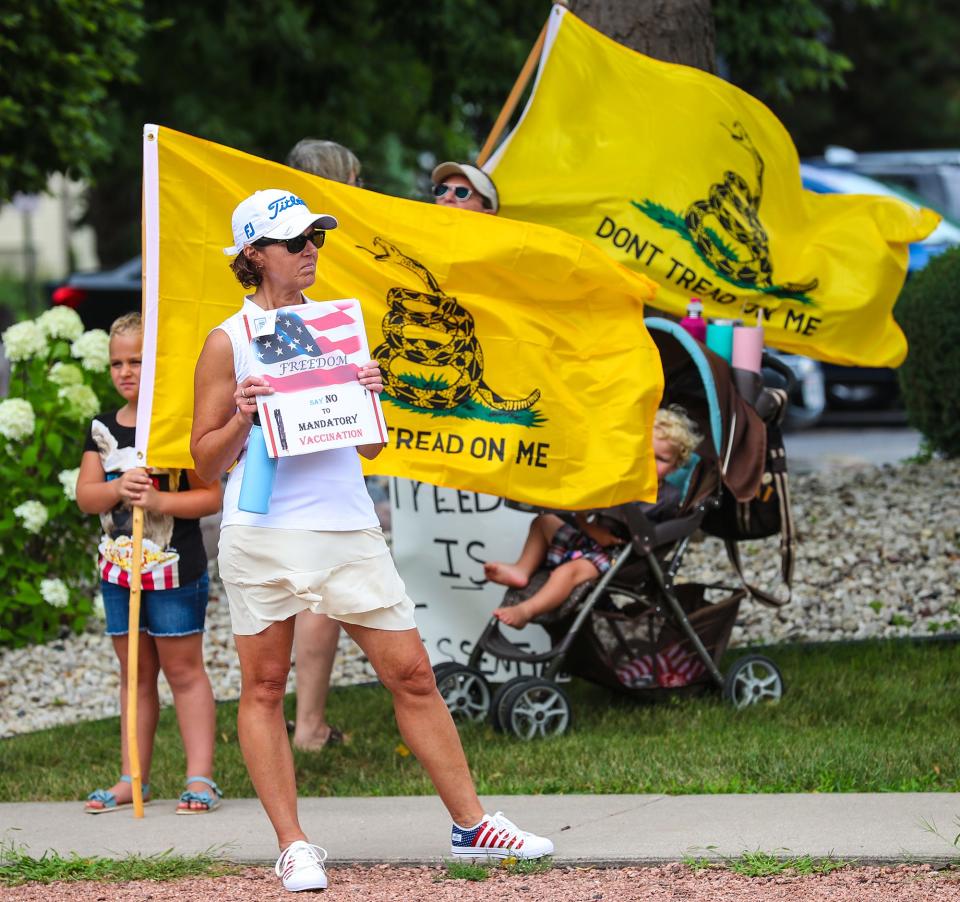
Exemptions have dramatically increased
Before the pandemic, health concerns about vaccines often centered on the discredited idea that vaccinations for measles, mumps and rubella cause autism.
A study published in 2015 by researchers at the University of Georgia found exemption rates for childhood vaccinations had increased, largely because of people opting out for religious and philosophical reasons rather than medical issues, such as an allergic reaction.

Vaccination rates were higher in states that required health departments to sign off on nonmedical exemptions or that had criminal or civil penalties for noncompliance.
The practice that contributed the most to lower vaccination rates was allowing people to opt out for religious or philosophical objections. An increase in exemptions was directly attributable to increased outbreaks of preventable diseases such as whooping cough and measles.
An outbreak of measles in California in 2014 prompted the state to end personal belief exemptions for required vaccines for students, making it one of the few states that does not offer a pass for personal or religious views.
Health economist W. David Bradford, one of the report’s authors, said religious exemptions may be necessary to get people to go along with vaccination mandates.
“You would like the policies to be driven strictly by public health considerations, but that's not the real world that we live in,” said Bradford, who teaches in a university system where vaccines are not required and he cannot insist students in his classroom mask up.
“A mandate with exemptions is better than no mandate,” he said.
More: Delta variant has college professors 'freaking out' about fall 2021 semester
Reiss expects to see many more requests for religious exemptions for COVID-19 mandates than have been granted for past vaccines.
Though low rates of exemptions can be absorbed, she said, "there's at least a decent chance that it'll be at a rate that puts people at risk.”
Tracking COVID-19 vaccinations: How many people have been vaccinated in the US?
Delta variant: It's more contagious for children. Is it making them sicker, too?
Objections to fetal cells
Some abortion opponents object to the use of a cell line from an abortion 36 years ago to create Johnson & Johnson’s coronavirus vaccine. Fetal cells were used in the early testing, though not in the production, of the Pfizer and Moderna vaccines.
The anti-abortion Catholic Church said the vaccines are “morally acceptable.”
"Given the urgency of this crisis, the lack of available alternative vaccines, and the fact that the connection between an abortion that occurred decades ago and receiving a vaccine produced today is remote, inoculation with the new COVID-19 vaccines in these circumstances can be morally justified,” the U.S. Conference of Catholic Bishops concluded in a statement in December.
Clarity for Catholics: It's OK to get Johnson & Johnson COVID-19 vaccine – if it's the only one available

The Archdiocese of New York has blocked priests from helping parishioners avoid vaccine mandates.
"There is no basis for a priest to issue a religious exemption to the vaccine," stated a July 30 memo to the archdiocese priests that was reported by Catholic News Service.
Colorado’s bishops publicized a template letter that pastors can sign for parishioners seeking to be exempted from vaccination requirements at work or at school.
“Vaccination is not a universal obligation and a person must obey his or her own conscience,” the letter says.
Should you get the COVID-19 vaccine? These questions (and answers) could help you make a decision

'Morally acceptable'
Such permission slips are not welcomed at the hundreds of hospitals and health facilities of the Catholic Health Association, the largest group of nonprofit health care providers in the nation.
“We have been very clear that the Vatican and church has basically said that getting a vaccine is morally acceptable,” said Sister Mary Haddad, the association’s president and CEO. “So there should be no religious exemption for a Catholic.”
Haddad estimated that less than 1% of staff has requested a religious exemption through what she called a “pretty stringent process.”
Employees offering as justification general beliefs about their body being a temple for the Holy Spirit won’t get one.
“That's just a statement, a term that you can pull out of Scripture,” Haddad said. “We can pull anything out of Scripture, but if you can’t apply it to your own life experience and what it means for you and articulate that in a way that is able to communicate a sense of full understanding on your part, that doesn't hold a lot of weight for me.”

'Temple of God'
That’s the kind of personal religious objection voiced by most of the people who reach out to Liberty Counsel for help.
“Some people say that their body is the temple of God and that they don't want to put anything in it that would harm their body,” said Staver, the group’s chairman.
It doesn’t legally matter, he said, whether a person’s view on vaccines aligns with what their church says.
“What's relevant is what the individual's religious belief is,” he said. “As long as it's a sincerely held religious belief, it is personal and not denominational or organizational.”

Staver said his organization was flooded with calls after the Department of Veterans Affairs became the first federal agency to require certain employees be vaccinated against COVID-19.
Though he thinks the VA should have immediately told health workers they could seek a religious exemption, Staver said the department’s process to opt out is “probably one of the easiest ones out there.”
Employees self-certify that a “deeply held religious belief” prevents them from receiving a vaccine.
The VA doesn’t have figures for how many workers have claimed an exemption because the deadline to request one hasn’t passed, according to a spokesperson.
'I expect them not to question me'
Brittany Smith, an office assistant in the radiology department of Baptist Health Hardin in Elizabethtown, Kentucky, is confident that the hospital will grant her request for a religious exemption.
Smith said her observance of her faith, Hebrew Roots, is known at work and she declined another vaccine.
Hebrew Roots followers adhere to the first five books of the Old Testament but also believe in Jesus Christ and the New Testament, including the apocalyptic book, the Book of Revelation.
Smith pointed to Revelation 18:23, a passage that declares all nations were deceived by sorcery. The Greek word for sorcery is pharmakeia, she noted.
“That’s a worry for us,” she said of one of her concerns about vaccines. “I do not think that this is the mark of the beast, but I absolutely think that it is part of the beast’s system and that it is a precursor to what is coming in the future.”
The 30-year-old said she’s not worried about getting the coronavirus because she’s worked in a hospital throughout the pandemic and has kept healthy through frequent hand-washing and boosting her immune system with Vitamin C and other supplements.
“We just really trust God to be our healer,” she said. “He created us with an immune system.”
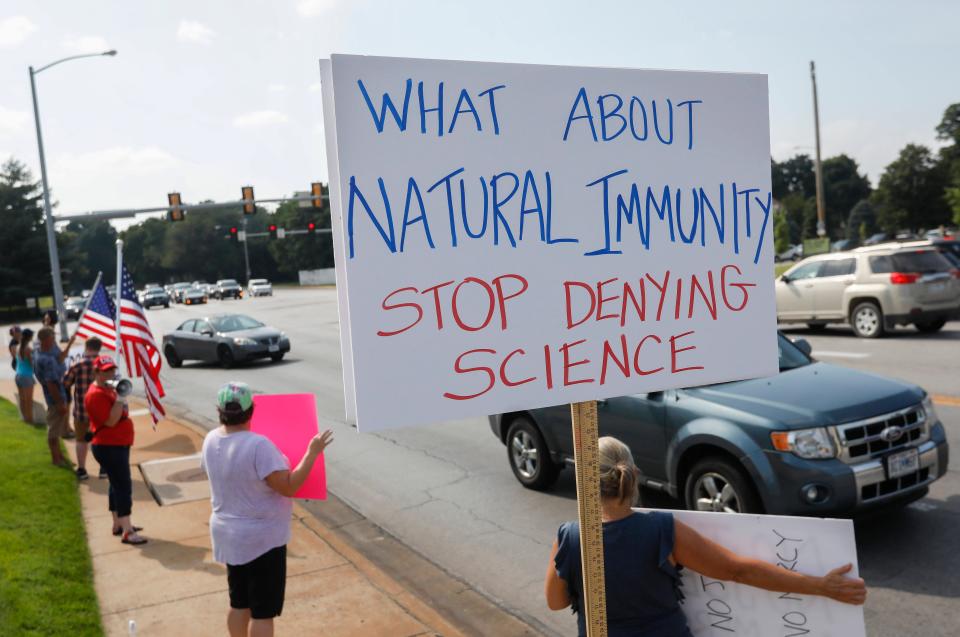
Smith has organized protests of her hospital’s mandate in solidarity with others who oppose it but might not qualify for an exemption.
She said public health experts have a legitimate concern that people will claim religious views they don’t have to get out of being vaccinated, but she doesn’t see that as reason for tougher scrutiny.
“I should be able to trust my employer, and I expect my employer to be able to trust me,” she said. “So when I say that I have this religion, I expect them not to question me.”
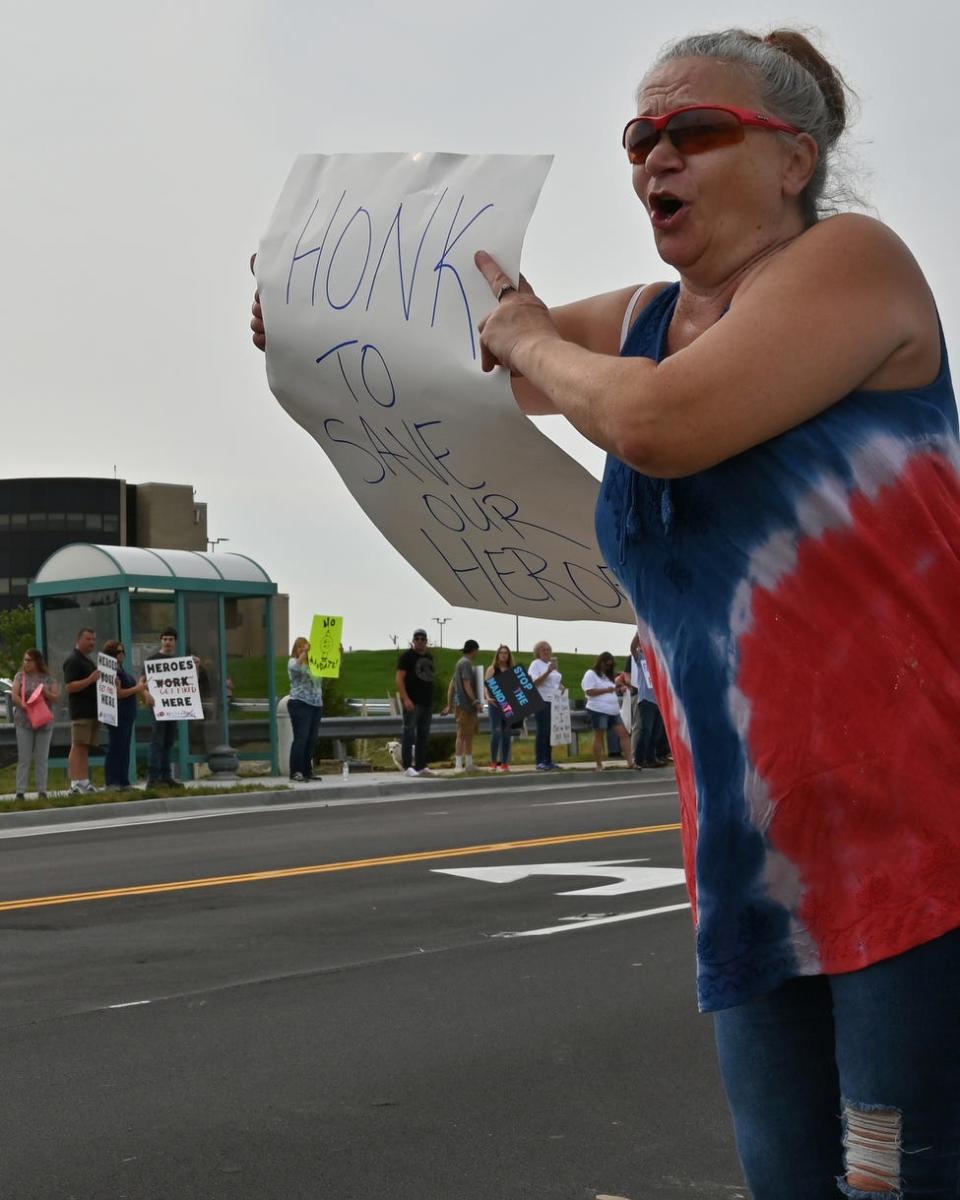
No 'fishing expeditions'
Doreen Martin, a partner in the labor and employment group at Venable, said an employer should presume that a worker's request for a religious accommodation is based on a sincerely held belief.
“But if you have some objective, reasonable basis for questioning the sincerity, then you can ask for additional information,” she said. “You don't want to go on a fishing expedition.”
Employers can ask employees to discuss their beliefs and how they’re followed and to provide written materials about the tenets of their faith and statements from others who have observed the employee discussing or practicing the beliefs, according to the law firm's guidance.
The vaccinated are angry: That's understandable but unproductive, health experts say

Venable has been getting a lot of questions about vaccination policies. Employers are used to dealing with accommodation requests for disabilities and handling that documentation. Assessing religious views is less common.
That’s why it’s important, Martin said, for businesses to have a clear, centralized decision-making process that handles requests consistently.
The case for no exemptions
Erwin Chemerinsky, dean of the University of California, Berkeley School of Law, has an easier solution: Don’t allow religious exemptions.
Chemerinsky argued that the Supreme Court has ruled the Constitution doesn’t require exceptions to laws that are generally applied and not motivated by a desire to interfere with religion.
Vaccination requirements are the epitome of such neutral laws, Chemerinsky said. Even if they weren’t, the government can infringe on religious freedom in service of a compelling interest – such as stopping the spread of a deadly communicable disease.

Though the Civil Rights Act requires employers to reasonably accommodate a worker’s religious beliefs, that can’t have more than a minimal cost or burden.
“I think there's no doubt that giving a religious exemption from COVID vaccinations could have more than a trivial effect on employers and the workplace,” he said. “The more people who are exempt, the greater the danger is to everybody who's present.”
Chemerinsky allowed that his legal argument doesn’t appear to be politically feasible. Multiple states have some form of prohibition on vaccination requirements and mask mandates.
“Some places are resistant to vaccine mandates altogether,” he said, “let alone vaccine mandates without a religious exemption.”
Florida Gov. DeSantis to school official: Enforce mask mandate, get your salaries withheld
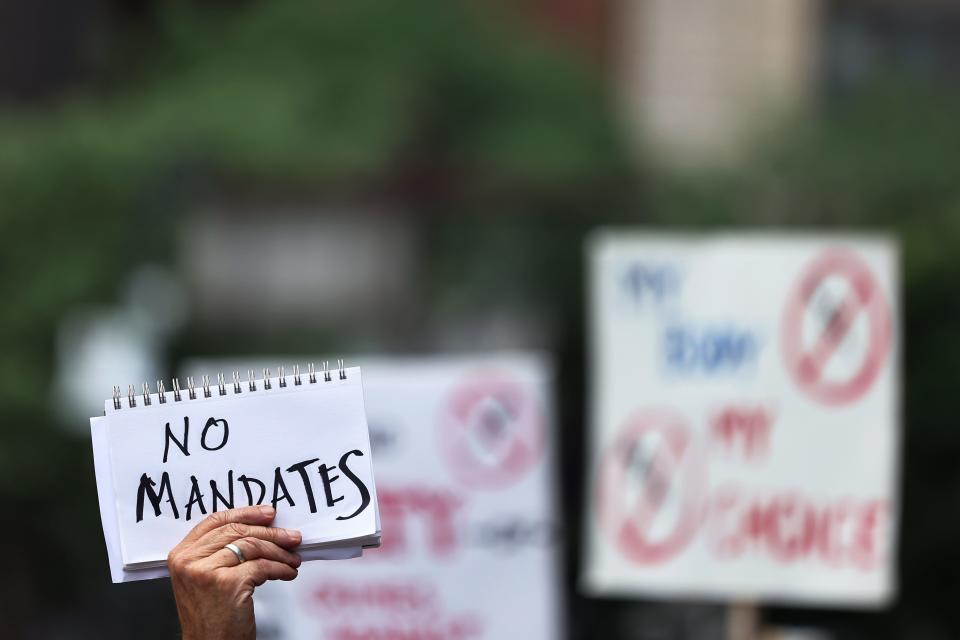
A religious exemption for the religious exemption
In the first challenge to a coronavirus vaccine mandate to reach Washington, the Supreme Court rejected an emergency relief request from eight Indiana University students last week.
Most of the students had been granted a religious exemption to the requirement that they be vaccinated before coming to campus.
Their lawyer told the Supreme Court Indiana University undercut its own defense of the requirement by offering so many ways to opt out that they “virtually guaranteed anyone can get an exemption.”
The students also oppose the school’s rule that anyone unvaccinated must wear a mask and be regularly tested.

Ashlee Nicole Morris, who wants to study law at IU, said her Bible teachings would be violated if she was forced to wear a mask or get tested for the coronavirus.
Business student Seth Crowder doesn't like how far up into the nasal cavity testing swabs go. He allowed in a deposition that he would drop his religious objections for a less invasive test – such as a swab to the fingertip.
As of last week, 85% of IU's students, faculty and staff had received at least one dose of the vaccine, according to the school. The rest have received exemptions or haven't reported their status.
A federal judge in Indiana’s northern district said that by offering religious exemptions for COVID-19 vaccines, Indiana University was to be applauded for going beyond what the Constitution requires.
“What the students request now is a religious exemption from the religious exemption,” wrote U.S. District Judge Damon Leichty, “but Indiana University has no obligation to provide this.”
Anthony Fauci: Get vaccinated to stop risk of a deadlier COVID-19 variant
Pandemic evictions: Federal court allows Biden's new COVID-19 eviction moratorium to remain
This article originally appeared on USA TODAY: Will religious exemptions undercut COVID-19 vaccines mandates?

